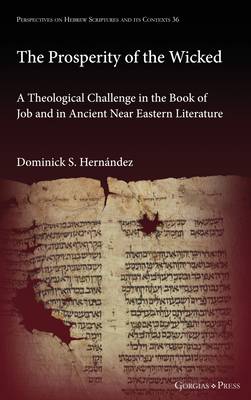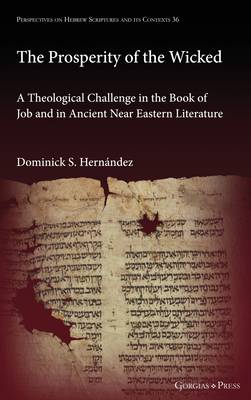
- Retrait gratuit dans votre magasin Club
- 7.000.000 titres dans notre catalogue
- Payer en toute sécurité
- Toujours un magasin près de chez vous
- Retrait gratuit dans votre magasin Club
- 7.000.0000 titres dans notre catalogue
- Payer en toute sécurité
- Toujours un magasin près de chez vous
The Prosperity of the Wicked
A Theological Challenge in the Book of Job and in Ancient Near Eastern Literature
Dominick S HernándezDescription
The book of Job has long been considered the biblical text that is most relevant to the question of theodicy. Therefore, much of its interpretational history has focused on considering theological explanations for the problem of innocent suffering. This emphasis on the "righteous sufferer" motif, though reasonable, has caused scholars to overlook what considerable sections of the first two rounds of dialogue communicate about the characters' perceptions concerning the fate of the wicked. To Job's friends, justice comes in the form of the wicked consistently suffering divinely appointed consequences for their sins, which is an outcome they eventually apply to Job as the conversation intensifies. According to Job, human experience blatantly contradicts his friends' claims about uniformity in retribution. Job's overt allegations about the inconsistency of God's justice, coupled with the assertion that the wicked prosper with no divine restraint, are revolutionary when compared to other sections of the Bible. As one branches out from the Bible to other ancient Near Eastern compositions (i.e., from Mesopotamia, the Levant, and Egypt), it is readily noticeable that several of the "righteous sufferer" compositions similarly exhibit the prevalence of the doctrine of just retribution, utilizing comparable language and imagery to communicate corresponding ideas to those in Job. Does Job convincingly argue against a fixed system of just retribution by proclaiming the prosperity of the wicked-an assertion that distinctly runs contrary to traditional biblical and ancient Near Eastern wisdom? This study addresses this question, giving careful consideration to the rhetoric, imagery, and literary devices used to treat the issue of the fate of the wicked in Job's first two rounds of dialogue, where the topic is predominantly disputed. The analysis will glean from related biblical and non-biblical texts to illustrate that Job specifically counters five recurring arguments of his friends' speeches that are based upon traditional wisdom.
Spécifications
Parties prenantes
- Auteur(s) :
- Editeur:
Contenu
- Nombre de pages :
- 360
- Langue:
- Anglais
- Collection :
- Tome:
- n° 36
Caractéristiques
- EAN:
- 9781463244248
- Date de parution :
- 30-11-22
- Format:
- Livre relié
- Format numérique:
- Genaaid
- Dimensions :
- 152 mm x 229 mm
- Poids :
- 648 g

Les avis
Nous publions uniquement les avis qui respectent les conditions requises. Consultez nos conditions pour les avis.






